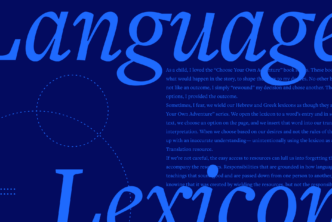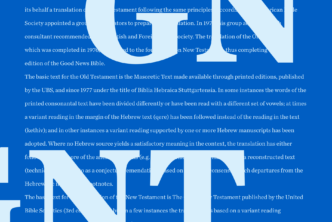Logos Pro Dr. Mark Ward discusses common errors made in applying the biblical languages, and how a Logos course can help you avoid them (0:10), and Dr. Steve Runge discusses the importance of a small Greek particle (5:45).
Learn how to use the biblical languages responsibly
Whether you want to learn Greek and Hebrew for the first time or are simply looking for a refresher, Michael Heiser and Johnny Cisneros are excellent guides. With this tools-based approach, you’ll learn the terminology, tools, and methods needed to interpret words and passages of Scripture—without memorization.
- Focused on exegesis. Rather than having you memorize vocabulary or translate phrases into English, lessons focus on using Greek and Hebrew to interpret the meaning of the text. Learn grammatical terms and concepts, proper methods for doing word studies, and common mistakes to avoid.
- Equipping you with tools. Video tutorials show you how to use the advanced language tools in Logos 6. You’ll also learn how to use dictionaries and lexicons, reverse interlinears, commentaries, and more.
- Connected to your library. Each course is transcribed and becomes a searchable Logos resource connected to grammars, reverse interlinears, and other resources in your library. Read along as you watch the lectures and jump to recommended readings with a click.
- Learning on your schedule. Watch 5–10-minute lectures from your mobile device or computer, whenever your schedule allows. Set your own pace, and then track your progress with quizzes and exams. These courses contain over 20 hours of lectures and demonstrations that will take you all the way from understanding the basics to performing advanced research techniques.
Keep learning with Dr. Runge
In these courses, Dr. Runge explains linguistic devices—the building blocks of discourse analysis—and how understanding these devices can help us better understand the New Testament writers’ intentions. You’ll learn how to recognize these devices in the text, what they contribute to your exegesis, and how they can sharpen your exposition of the text. You’ll then put these methods into practice with Dr. Runge’s help as he guides you through Philippians.
Get the bundle now.
Get this month’s free book
Using the popular four-views format, Four Views on the Warning Passages in Hebrews explores the meaning of the five warning passages in the book of Hebrews to both the original readers and us today. Each of the four New Testament scholars present and defend their view and critique the view of their interlocutors. This unique volume will help readers better understand some of the most difficult passages in all of Scripture.




